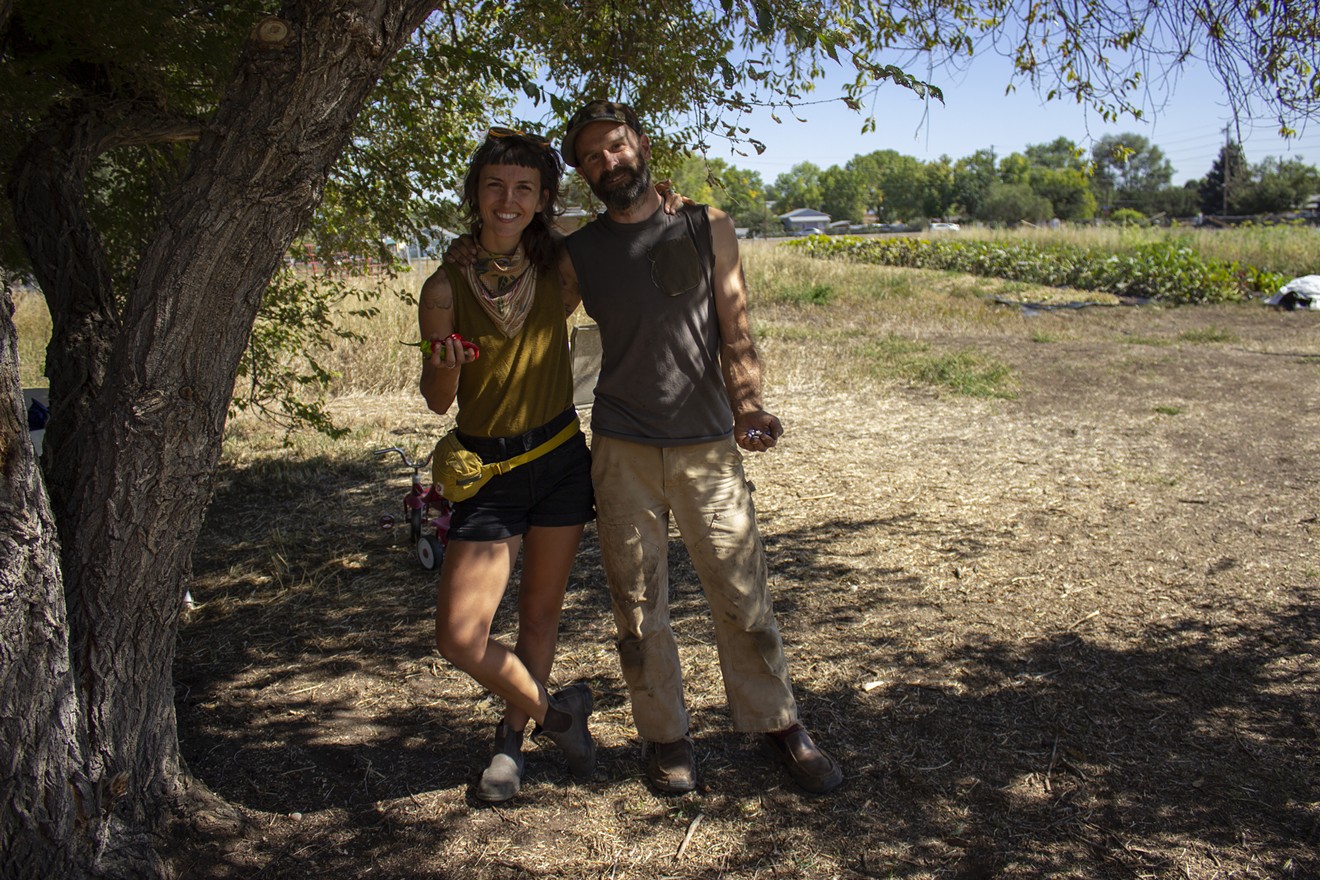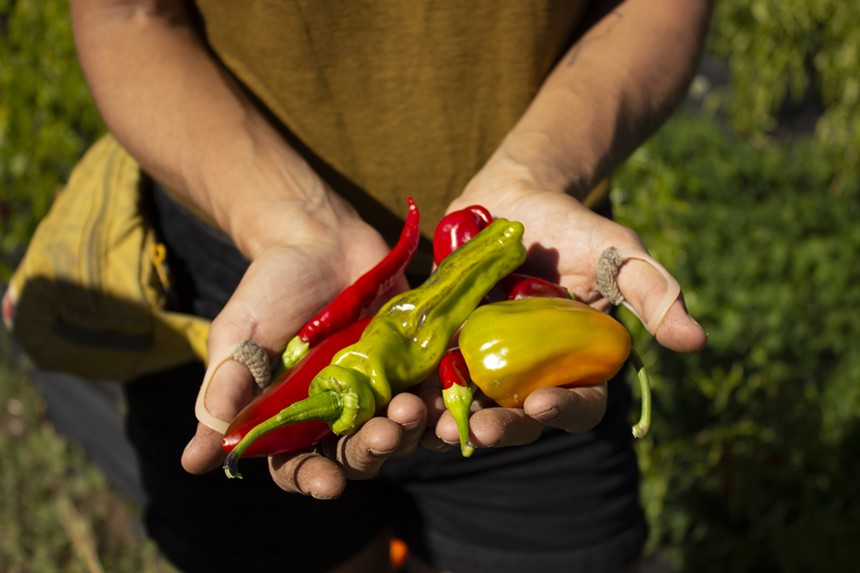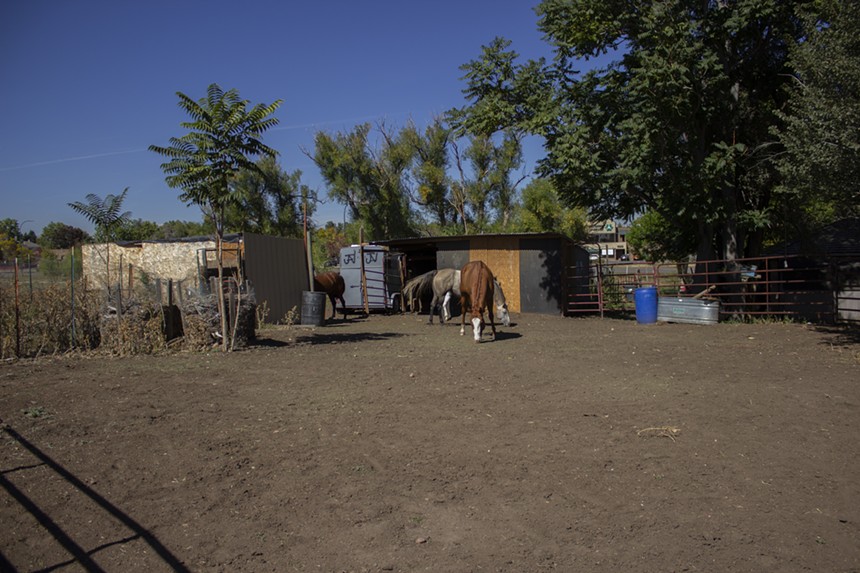At a certain point, though, they stopped looking at the books. “That’s not really who we are,” Trueheart explains.
Though they have many years of experience in production agriculture, the three founders — Trueheart, Phil Cordelli and Betzi Jackson — wanted to honor a more humble inspiration: the common stories, farming practices and community spirit that exist beyond scientific frameworks.
They settled on Common Name Farm, and broke ground this past April. Throughout their first season, they’ve sought to prioritize passion, play and goals that nurture both the community and the land.
Their combination of new farming techniques and age-old practices complement Common Name Farm’s location on the remnants of a 150-year-old farm that once covered two square miles across what’s now the city of Lakewood. They’re renting three acres from the Shelleys, a family that has raised horses and hay on the property for generations.
As the season winds down, the Common Name Farm partners are still harvesting squash varieties and root vegetables, creating bouquets from flowering herbs and planning to save seeds for next year.
Trueheart and Cordelli have each been farming for a little over a decade. “I think in retrospect, I’m not suited for much other than farming,” Cordelli admits. “I’m kind of loud. I don’t wear deodorant. I went to art school.” He was first introduced to farming in northern California, where he worked deep in a redwood forest a few miles from the Pacific Ocean. He’s been drawn to cultivating plants ever since.
Trueheart stumbled onto farming while working as a field archeologist in western Colorado. One day she found an orchard in Paonia and “was totally enamored,” she recalls. “The first day I was there, I was like, ‘Oh, my God, I have to know everything about this.’” A year a half later, farming had become her top priority — a priority that cost her about half her pay.
Last fall, Cordelli, Trueheart and Jackson, who’d grown up in unincorporated Jefferson County, made the decision to stop working for others and start their own farm. Finding land was a challenge, though. They looked for properties from Boulder to Sedalia. When they found places they liked, they sent owners “handwritten letters of inquiry,” Trueheart explains.
By late winter, they were close to signing a lease for a property in Boulder, but the landowners backed out.
After that, Cordelli, Trueheart and Jackson searched for part-time jobs. Jackson found a position on the Western Slope and moved in April, though she remains a mentor, advisor and friend to Cordelli and Trueheart.
The other two spent the early spring growing seedlings in Cordelli’s sunroom on “a wing and a prayer,” he remembers.
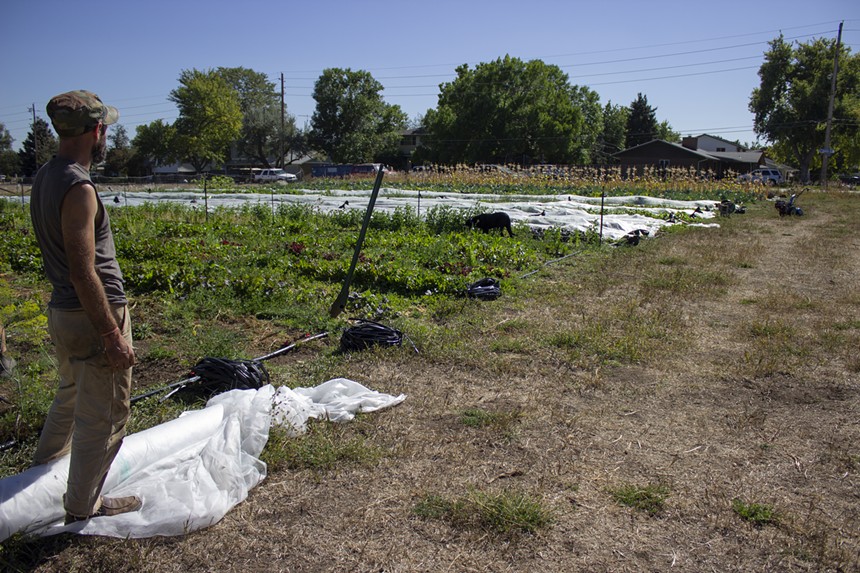
Cordelli and Trueheart have each been in agriculture for over a decade but this is their first farm.
Claire Duncombe
Colorado’s Front Range farming community is pretty small, Cordelli explains, and most people involved know each other. Many are younger farmers like Cordelli and Trueheart — though at 42, “perhaps in no other profession would I be considered young,” Cordelli notes.
The local farming community “has really supported us,” he adds. Throughout the spring and summer, Cordelli and Trueheart were able to borrow tractors and rototillers to prep the field. Other farms donated seedlings to help them catch up after their late start to the season.
“Both of us hate the toxic American masculine culture of ‘I did this all myself,’” Cordelli notes. “It’s not about ego. It’s about creating community and relying on community.”
It’s also about the land. “We attribute a lot of the [farm’s] success to the quality of the soil,” Trueheart explains.
“We had a hunch that the land would be productive,” Cordelli continues. “It’d never been sprayed. It was covered by plant material continuously — no bare soil blown away by the wind or burned up by the Colorado sun.”
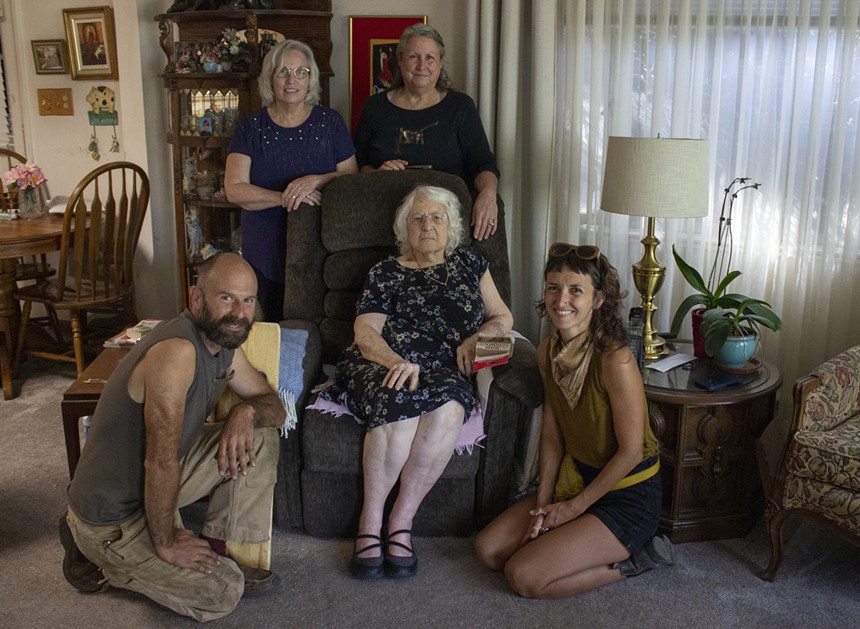
Cordelli and Trueheart with Miss Betty Shelley and daughters Terol (left) and Trudy.
Claire Duncombe
Her husband’s family had lived on the property since the 1870s. John Everitt started with twenty acres — including the land where Common Name Farm sits — and eventually expanded the property from what is now Mississippi Avenue to Alameda Avenue and from Garrison to Union Street, for a total of two square miles.
“When he homesteaded here, he did the alfalfa,” recalls Terol’s sister, Trudy Shelley-Avery. “He had a brother that homesteaded out in Parker — they did beef — and a sister in Valverde. ... She had the dairy.”
By the time Terol and Trudy were growing up in the 1960s, much of the acreage had been divided between relatives or sold or donated to the city for roads and parks. But it was still open space.
The closest grocery store was a Red Owl about a mile away on Garrison and Sixth Avenue. There was a bar across the street, though, and Terol and Trudy remember listening through their open windows to the Queen City Jazz Band play on weekends to a chorus of crickets and frogs.
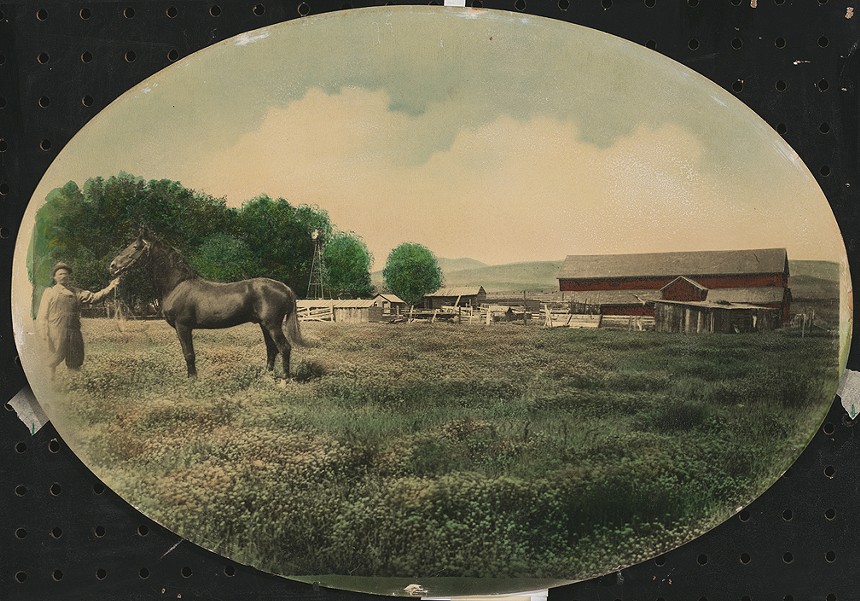
John Everitt and his Morgan stallion standing by the original barn from the homestead on what is now Garrison Street.
Courtesy of the Shelleys
“We used to ride our horses up to Kipling and Alameda and turn onto the dirt road, and then were free,” Terol adds.
“One day we rode all the way to Red Rocks,” Trudy continues.
Even after Lakewood incorporated fifty years ago and development began to boom, the Shelleys continued to farm their land. Both Trudy and Terol grew and sold hay with their children. Then Derek and Kamise ran the Everitt Family Farm until they moved to Idaho a couple of years ago.
The family believes that “at that time, this was the longest, continuously farmed piece of land in Colorado,” Trudy adds.
Now Cordelli and Trueheart are continuing that tradition. The Shelleys’ open space and horses are still a landmark in the neighborhood, and that history helps Common Name Farm connect with customers at the Lakewood Farmers Market at Mile Hi Church, where they set up every Saturday.
“Everyone knows this property from the horses because they’re visible on Alameda and Garrison,” Trueheart explains.
Other remnants of Lakewood’s agricultural past are less obvious, including the 100-year-old apple trees that dot nearby yards and the ditch irrigation that Common Name Farm uses as a water source. Trudy and Terol Shelley’s grandfather was the ditch rider who built the waterway down from Clear Creek in the 1920s.
“Neither of us have ever farmed on ditch irrigation land before,” Trueheart says. “It is a little bit challenging, but this is where the anthropology nerd in me comes out.” Ditch irrigation has been an agricultural technique for thousands of years; the human-made ditches allow water to travel from rivers to crops, and farmers monitor how much to allow into their fields.
“It’s just super-rad to connect to all the human history of farming,” she adds. “The beauty and the vulnerability of being at the mercy of the climate in a day-to-day way.”
“We don’t actually ever know when the irrigation ditch will start flowing and stop flowing,” Cordelli notes, adding that it’s dependent on the snowpack and rainfall. “It forces you to think about what’s happening upstream.”
“And what’s downstream,” Trueheart continues. “It lends to a deeper connection with the land and farmer and all the stewards of the land. ... We’re way more cognizant of only taking what we need.”
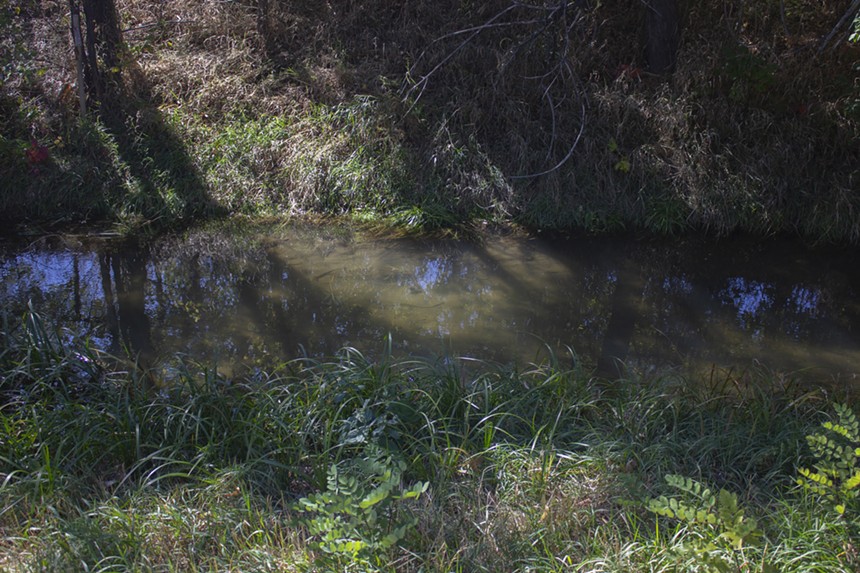
Common Name sources its water from an irrigation ditch connected to Clear Creek; Trudy and Terol Shelley's grandfather dug the ditch.
Claire Duncombe
“Getting another crop of lettuce or radishes in there makes more economic sense,” Cordelli explains. But “cool little beans...make us happy, and that’s hugely valuable. As much as possible, we’re mimicking, learning from and implementing healthy natural systems.”
They’re taking a regenerative approach to agriculture that prioritizes sustainability and working within natural systems. They practice techniques such as planting flowers like marigolds that attract beneficial bugs and help repel pests, and keeping the ground between covered rows with low-growing clover.
Cordelli and Trueheart are also dedicated to donating portions of their harvest to those in need. Trueheart and her daughter live at Warren Village, a housing option for single mothers experiencing homelessness. “It’s been a great place to start with our food-access work,” Trueheart explains. “We’ve learned about what people like and don’t like as much, and the food they care about.”
They’ve also donated some of their harvest to Metro Caring and Kaizen Food Rescue, and would like to continue to develop their donation system. “We really wanted to keep food justice ideals and beliefs at the forefront of our farming practice,” Cordelli explains.
That’s part of the bigger picture Cordelli and Trueheart want to prioritize, rather than focusing strictly on production.
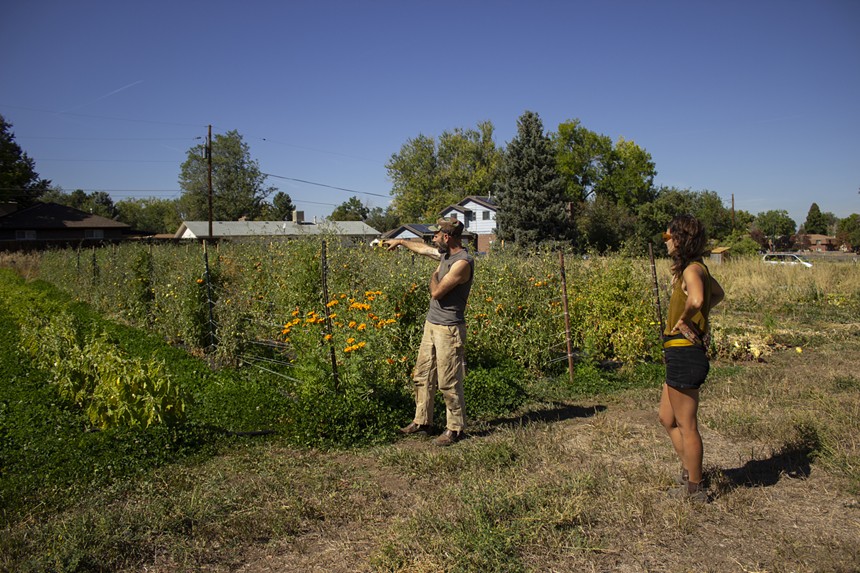
They plan to expand the farm to a full three acres next year and double the size of their CSA.
Claire Duncombe
“Every small farm is an act of rebellion to the food system that is so often oppressive,” Trueheart adds.
“It’s easy to go into [creating a new farm] with some pretty idealistic notions,” Cordelli says. But as the season winds down, he points out, “We did what we said we’d do. We’re a new farm. We sunk a lot of blood, sweat and tears into this, and we gave some away. We feel really intense pride.”
Cordelli and Trueheart were able to plant an acre and a half of the three acres they’re renting. They started a CSA for forty members. Next year, they hope to plant all of their land and support a hundred CSA members; sign-ups wlll start in November.
Common Name Farm produced many varieties of vegetables and herbs during its first season. Alongside rows of tomatoes, corn, beans, potatoes and leafy greens, the partners experimented with okra and de-hybridizing a Korean hot pepper into the single varieties from which it was created. Soon they’ll be planting garlic seeds for spring.
Their “garden was wonderful,” Miss Betty Shelley says. “I couldn’t imagine [how they] got it going so fast. They had a lot of things going on. It was beautiful.”
“Really productive,” Terol Shelley adds. “Really good farmers.”
But Cordelli and Trueheart credit the soil that sustained their plants and helped support farmers for generations.
“Common Name reflects the ground we’re working,” Cordelli says. “We really feel that it implies a belief in art, in magic, in folklore, in community, in feeding. It’s a good self-portrait for how we approach farming — this collaborative process we’ve been engaged in.”

